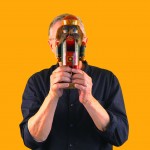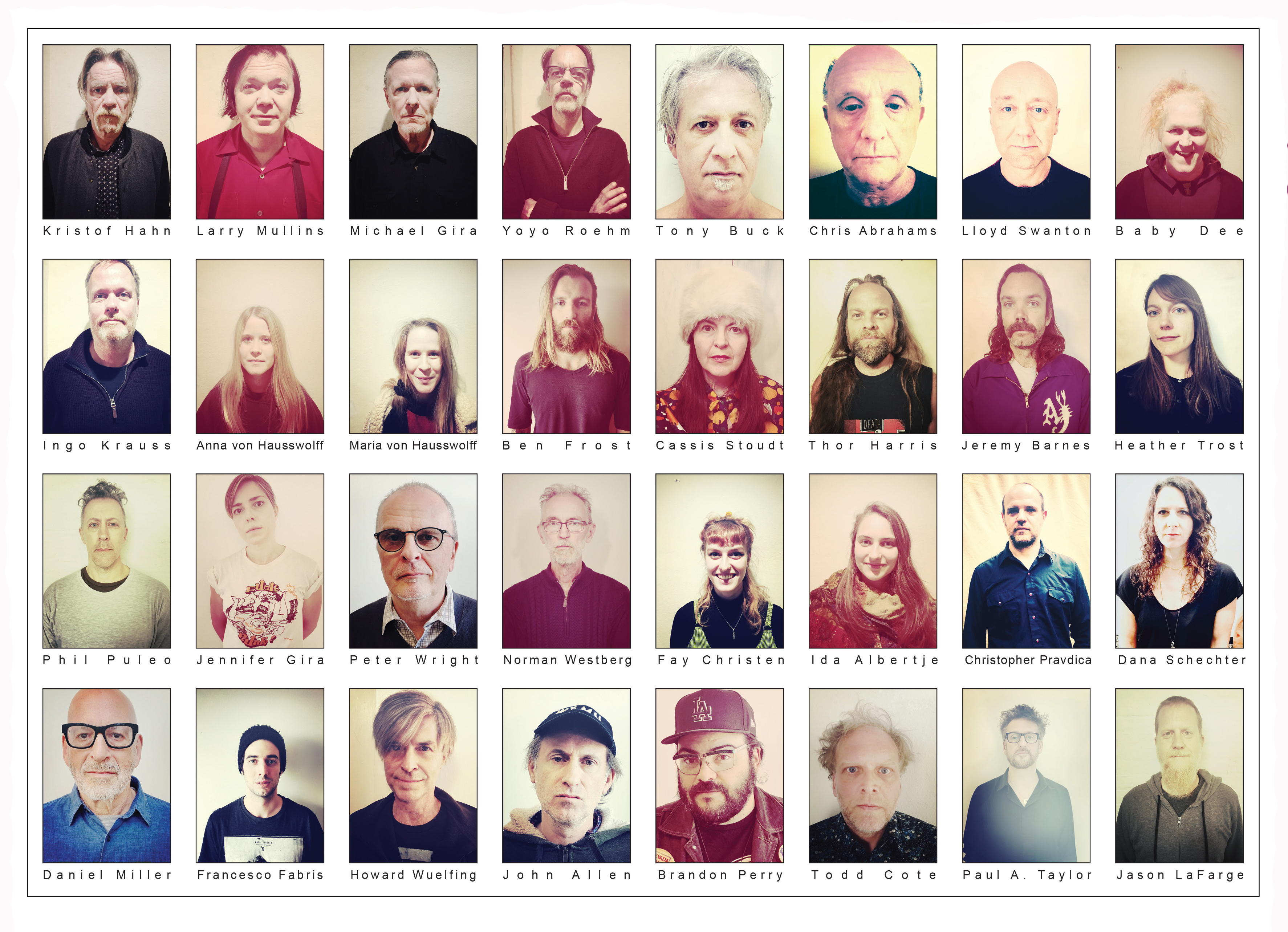 Shortly before the release of their previous album “The Glowing Man”, Michael Gira announced that he would disband the Swans in the fixed constellation, in which they had existed since 2010, to work with a rather loose collective of musicians instead. “Leaving Meaning”, the recently released album, was recorded with well-known former band members (e.g. Christof Hahn, Thor Harris, Norman Westberg) as well as with new faces (e.g. Ben Frost, The Necks, Baby Dee, Anna von Hauswolff). I spoke to Michael Gira while he was on a solo tour in Europe.
Shortly before the release of their previous album “The Glowing Man”, Michael Gira announced that he would disband the Swans in the fixed constellation, in which they had existed since 2010, to work with a rather loose collective of musicians instead. “Leaving Meaning”, the recently released album, was recorded with well-known former band members (e.g. Christof Hahn, Thor Harris, Norman Westberg) as well as with new faces (e.g. Ben Frost, The Necks, Baby Dee, Anna von Hauswolff). I spoke to Michael Gira while he was on a solo tour in Europe.
I remember reading some years ago that you said that that particular incarnation of Swans felt like the most connected group. Later you announced that you would stop Swans the way they had been going for some years. Would you say that it was a logistical matter, a physical, a financial one? I mean, I saw you live a couple of times, in Cologne, Frankfurt, Atlanta and it was an incredibly physical experience – in the most positive sense of the word.
Sure, for us it was physical, spiritual, emotional. Everything. It was a high point of the career because as a group we were kind of clairvoyant. We’d read each other’s minds as we played and since improvisation was such an important part of the process it enabled the music to unfold in front of us as we were witnessing it and not actually making it happen ourselves. It was very strange but after having been in such close proximity with six people, for well over 200 days a year, you begin some point of diminishing returns. There’s no further you can go with it. So I think we cut it off at the kind of correct time and it was a good point to move into something else, something unfamiliar.
In the inlay to the CD with the demo versions of the new songs it says “record the album. With whom? Where?“ How did you decide who would be part of this new incarnation of Swans and who would do what?
Well, I made a list of ideal people with whom I would collaborate and it was based not only on their musical skills but I pictured them in a room with me or with the group of people playing and how would that look? How would that feel? So I chose people according to those criteria. Musical skills one of them, but also who they are what their sensibilities are. That was just as important. That’s how I came to work with these people on this record. It’s no longer a band per se. It’s just a collection of individuals I gather in order to produce a record or to make a tour.
How did you decide that Baby Dee would sing on “The Nub“? She’s amazing.
She played with us on a couple of tours. I love her personally. She is tremendously talented and funny and great as person. I was playing the guitar figure that is the basis of that song and I was humming along and then suddenly there was this image in my mind that came out of nowhere: Baby Dee floating in space wearing nothing but diapers drinking milk from the stars.
I guess she loved that image.
So having that image allowed the song to write itself and then I contacted her and she thought it was a wonderful idea singing that song and I think she appreciated the work and so I flew her to Berlin to perform the song. She did it like a true professional in one take. She is a great cabaret performer. So that was a wonderful experience.
What would you say is the relationship between the new album and the last three? You may call them a trilogy. There seem to be similarities but also differences.
I work with a lot of people and I collaborate with them and I’m also the director, I suppose that’s a good word for it. It was my job to decide what things in the last three albums were becoming predictable and what things were a potential to move forward. So I chose things that could move forward. Certainly not have the kind of slow motion explosions on a downbeat that became a signature, a kind of trope for Swans. Nor could I have the ever escalating crescendos or the tornadoes of dissonant sound. So what remained? What remained were the songs and the tones around the chords and the voice. Then the task was how to create a visual picture, an audiovisual picture. So I gathered the musicians and then I kind of directed it.
You’ve just mentioned that there aren’t any more of those crescendos anymore. I feel that the new album is – for want of a better term – slightly more contemplative.
When I’m in the studio making music, I don’t use adjectives like that to describe it. I don’t see it in the history of a band. I don’t place it in a pop context. I don’t apply any kind of critical thinking in that regard.
When looking at some of the words on the album: When I listened to “Your Phantom Limb“ and there it says “music is sacred / love is sacred / silence is sacred“ and at the end you’ve got “we’re flying / we’re rising“. Would you say that is somehow a programmatic?
Problematic?
No, programmatic. In the sense of this being a central idea, a leitmotif.
I don’t know. Perhaps. I suppose if one concentrates, truly concentrates on their existence, inwards and outwards simultaneously, everything achieves an equal urgency. It’s those states of mind that I admire really. Without judgement or even words to be subsumed, completely penetrated by experience is an ideal state of mind for me.
 Would you say that that is something than you can also – ideally – achieve in a live context?
Would you say that that is something than you can also – ideally – achieve in a live context?
Certainly in the last version of Swans there were times – not all the time, certainly – when the music was churning and unfolding. We weren’t playing. It was happening to all of us including the audience. With our active participation but to an extent where it took over. It was really a kind of wonderful thing being so exactly attuned to the magic of experience through sound.
Well, every time I saw you I thought this is extremely physical, also for the audience and I asked myself how you managed to do this – especially when you are on a long tour.
I don’t know how we did it. I don’t do it anymore. I’m sixty-five years old and there’s something in my bones resembling age and the kind of stamina that is required for three-hour performances, six nights a week, no sleep etc. is not possible anymore but it was not only physical it was also something beyond that as well and it was tremendously rewarding for us and also for the audience. It was a great experience and I’m very happy that that was a part of my life.
You mentioned at the beginning when you talked about the recording of the new album that you didn’t want to repeat yourself and I’ve just read that on the new tour you will play material from “Leaving Meaning“ as well as unreleased material, new material. Is that right?
Well, yes. This material doesn’t exist yet but my first job when I get home from this tour in a couple of weeks is to picture all the people with whom I’ll be playing on tour in a room with each other and write some new material specifically for this ensemble. I don’t want just depict or repeat the songs that are on this record. That’s not for me. Some people do it. I’m not interested in that. I wanna use the material as vehicle, a starting point to make something else, greater than the material.
When you look around and you see a lot of bands that have been around for as long as you have, many of them seem to be some kind of nostalgia act, playing a best of and they recorded the last new songs ages ago and nothing new is coming.
Yeah. One has a very limited amount of time on earth and I don’t see any point in wasting time doing the same things.
Life’s short. Unfortunately. I guess.
Because it’s so short it can be incredibly powerful and maybe even transcendent.
Do you feel a ind of satisfaction that now so many people come to see Swans and you finally reap the rewards you deserve?
Well, it’s certainly nice to have an audience that comes in order to experience what Swans can provide and it’s nice to see that it’s quite a number of them. One always has to see if one wants to retain integrity as an artist one always has to be cautious of allowing notoriety or pain to have any meaning in their lives because that’s the corruptor of truth so I think it’s important that I make good work and work that has value for oneself and others and going with that goal in mind.
There’s one more thing I wanted to ask you that is not directly related to the album. I’ve got your collection of short stories “The Egg“ and I was wondering whether there’s a difference between writing these stories or lyrics or are there a lot of similarities?
I would say that the similarity that they bear to one another would be that when I start I have no idea where the fuck it’s going and if I’m lucky an image appears and if I’m even luckier another image appears attached to that image and gradually something is forged. I mean the stories aren’t really stories, they are more scenarios, situations. I have no hope of writing like a normal writer, you know, writing characters and plot although I enjoy that very much reading it myself but I approach writing more like a visual artist. I just describe a situation and then get fuck out of town when that starts.
Interview: MG, Pictures: Jennifer Gira
